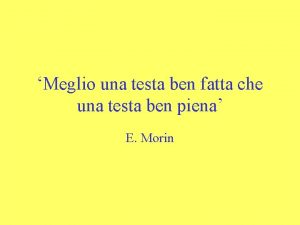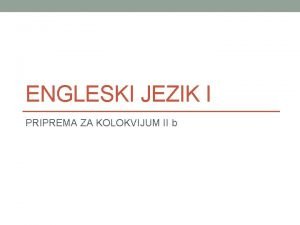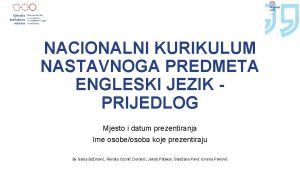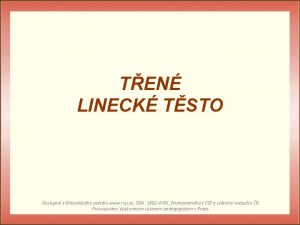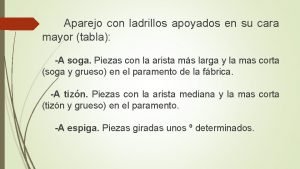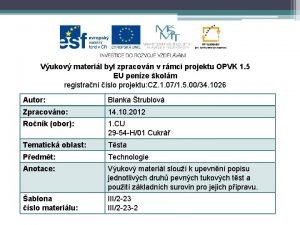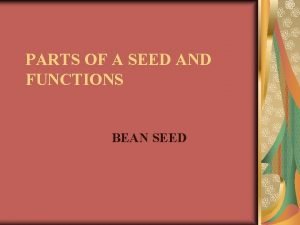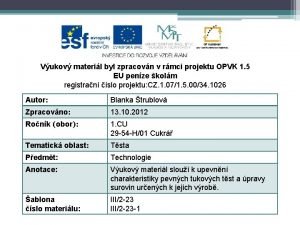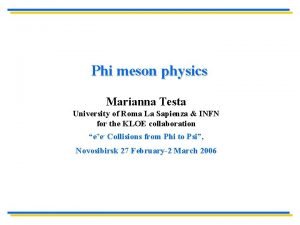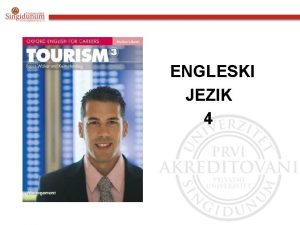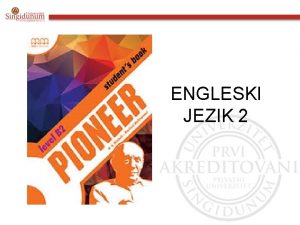ENGLESKI JEZIK 1 Engleski jezik 1 Datum testa














- Slides: 14

ENGLESKI JEZIK 1

Engleski jezik 1 Datum testa: 9. 4. 2020. Raspored po grupama: 17 h, SII 18 h, IR 19 h, IT Link za pristup testu: https: //testus. singidunum. ac. rs/Student? Module=MMTutor_Student&Method=L ogin

III TEST Lekcije 4, 5 (polovina) (udžbenik Pioneer) Broj pitanja: 15 Broj bodova: 15 Vreme trajanja: 10 minuta Minimum bodova: 8 Tip pitanja: višestruki izbor (multiple choice)

Oblasti 1. Leksika a ) Teme: putovanja, sport, zdravlje (unit 4 –Pack your bags Unit 5 – In Shape) Tekstovi: str 44, 56, 57 (reči iz lekcija/tekstova, izrazi, kolokacije itd. ) b) words easily confused (str. 46, 58) Primer: The _______ home took 2 hours. (journey/trip/travel) The tennis _____ was canceled. (match, game, race) Primer sličnih reči: cottage/cabin, house; arrive, get, reach itd. fan, spectator, viewer, audience

c) Frazalni glagoli u vezi sa temom putovanja (str. 49): Check in/check out, call off, drop off, get away, head for, make out, put off, put up, see off, set off, stop over Primer: Can you please _______ at the airport. (drop me off, stop me over, get me away) d) Reči i izrazi koji su u vezi sa temom putovanja (str. 49): Departure lounge, on board, aisle, in-flight, trolley Single, return, timetable, connecting train, fare Primer: Hello, I’d like a return/single ticket to Madrid, please.

e) Idiomi u vezi sa sportom (su ustaljeni izrazi ili frazeologizmi čije se značenje mora posebno naučiti kao celina, oko 25, 000 u engleskom jeziku) str. 58 Below the belt, give smth. best shot, get the ball rolling, keep one’s head above water, go the full distance, show sb. the ropes, the ball is in one’s court, jump the gun, saved by the bell. Primer: They offered me the job so the ball is in my court now! Recnik: https: //www. ldoceonline. com/

2. Vremena (Future Simple, Future Continuous, Future Perfect Continuous, Present Simple, going to, Present Continuous + time clauses ) Na stranici predmeta nalaze se objašnjenja za svako vreme u obliku PPT prezentacije (strane u udžbeniku sa objašnjenjima: 47, 168) Primer: By the end of the summer I ______ the decision. a)am making b)make c)will have made d)will be making

Future Progressive Will + be + verb ING This time next year I will be travelling to Lisboan. (action in progress at a specific time in the future) Future Perfect Simple Will + have + past participle By the time you arrive I will have washed the dishes. (an action that will be completed before another action in the future or before a specific time in the future) TIME EXPRESSIONS: By+ a point in time, by then, before, etc. Future perfect progressive Will have been + verb. ING By midnight, we will have been flying for seven hours. (shows the duration of an action up to a certain point of time in the future, and it may continue further)

Clause: S+V (A dog sleeps. ) Time clause: preceded by adv. or adv. phrases that show they represent a time. These include: when, after, until, as soon as, before, until, while We NEVER use future forms in time clauses. When I see Anna, I will tell her you called. Don’t wait until she COMES home to tell her that you failed the exam.

a) Zero conditional sentences (general truths/facts) form: If clause + main clause (If /when present simple, present simple ) If you heat water to 100 degrees it boils. If/when you press the button, the machine starts. b) First conditional sentences (something likely to happen in the future) form: If clause + main clause (If present simple + will, can, must, may, might, should + base form) If I see him today, I will tell him to call you. If you see him today, tell him I called. (present simple + imperative) Note: If can also be followed by can, can’t, present perfect (to emphasize completion), going to, present continuous with future meaning If you can’t answer exercise 1, you won’t be able to do exercise 2. If you have finished washing your hands, I will help you set the table. If you are going to buy a car, I’ll lend you some money.

If clauses with will : future results a) There are some if-sentences that describe the possible results of an offer. In these sentences, will is used in the if-clause I’ll talk to your teacher, if that will stop you worrying so much. b) In some if-sentences, if is followed by emphasized will, meaning “insist on”, or won’t meaning “refuse to” If you will wear such thin clothes, of course you’ll feel cold. If you won’t listen to common sense, there’s no point my talking to you. c) If can be followed by will and would as polite request forms If you’ll just wait here, I’ll tell Mr Brown that you’ve arrived. If you’d just fill in this form, I’ll check the details.

Expressions used in conditionals: Unless is used instead of IF NOT I won’t buy it unless you agree. (If you don’t agree) As long as/provided /providing/on condition (that) = (only if) You can borrow my dress as long as you give it back In case (with the meaning)– because there is a possibility something will happen I’ll take a taxi in case I am late. Suppose/supposing (with the meaning) - (imagine) Supposing you don’t find a job by next month, what will you do? (Imagine that you don’t) Practice pg: 50/54

c) Modalni glagoli: can, could, be able to, must (not), have to, don’t have to, need (not), don’t need to, will, may, might, can’t, should, ought to, had better (str. 59/169) 1. Ability (can/be able to) 2. Obligations/necessity (must, have to, need) 3. Absence of obligation/necessity (don’t have to, don’t need to, needn’t) 4. Prohibition/permission (mustn’t, can could may might) 5. Request/Advice/Opinion (can could may will would; shouldn’t, ought (not) to, had better) I _______ to lose weight if I want to fit into a smaller dress. a) could b) must c) need d) may

SREĆNO!
